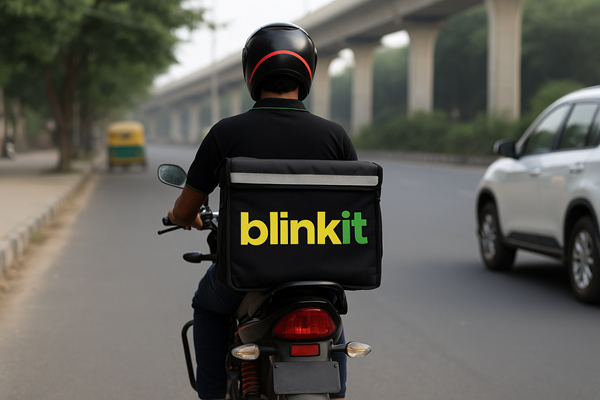.png)

Dev Chandrasekhar advises corporates on big picture narratives relating to strategy, markets, and policy.
July 26, 2025 at 6:09 AM IST
The venture capital-funded playbook for disrupting Indian markets is usually about raising enormous sums, undercutting incumbents on price, scaling rapidly, figuring out profitability later.
In India's quick commerce sector, that script is getting a rewrite.
On July 22, the market capitalisation of Eternal Ltd, widely known as the owner of food delivery app Zomato, crossed ₹3 trillion, eclipsing the likes of IT giant Wipro and automotive giant Tata Motors. What started off as a food app now appears to be seen by the markets as India’s top logistics-first tech platform.
The “old” e-commerce biggies have tried their best to stop this rise. Amazon Now, Flipkart Minutes, and JioMart are throwing the kitchen sink at the quick commerce pioneers like Eternal’s Blinkit, Swiggy's Instamart, and Zepto. Flipkart Minutes, for example, is offering discounts just under 40% on basket items.
Eternal also owns District, the local events-dining-shopping app, and Hyperpure which is a B2B sourcing app for the hospitality industry.
The problem? Those kitchen sinks are not being delivered reliably.
While Flipkart, Amazon and JioMart throw discounts at users in a desperate market-grab, Blinkit, Instamart and Zepto do that and more, the most important on-schedule delivery. The new competitors are playing the game like it’s still 2015—deep discounting, shallow execution. But in 2025, operational leverage is the new blitzscaling.
The assortment gap becomes even starker in high-frequency categories. In personal care products, incumbents average over 90% availability while new entrants struggle to stock even 65% of common items. Try explaining to investors why your customer acquisition cost is spiking when you can't reliably deliver toothpaste.
Instant Gratification Economics
To know Blinkit is winning, understanding "take rate"—the share of transaction value that platforms keep as revenue—is crucial.
Think of take rate as the "tax" a platform charges for providing service. Blinkit's 18% take rate on a ₹665 average order means it keeps roughly ₹120 per transaction through a combination of delivery fees, merchant commissions, and advertising revenue. Instamart's 15.7% take rate on a ₹527 order generates ₹83 per transaction.
That 230-basis-point take rate gap, combined with lower order values, helps explain why Blinkit achieved positive adjusted EBITDA while second-placed Instamart continues burning cash despite similar scale. For context, Zomato's established food delivery platform commands over 21% take rates.
In a business, where real estate and labour costs are largely fixed, that operational efficiency creates real margin headroom. It determines whether platforms can sustain their take rates or must sacrifice margins to remain competitive.
What the incumbents understood early
Zomato's journey illustrates why operational depth matters more than growth-at-any-cost strategies. The company spent years perfecting food delivery logistics—building demand prediction algorithms, optimising delivery partner networks, and developing merchant relationships—before expanding into quick commerce through Blinkit's acquisition.
That foundational work shows. Zomato's food delivery business generates superior take rates precisely because it solved the mundane challenges of urban logistics at scale. When the company applied those learnings to quick commerce, Blinkit achieved market leadership not through discounting but through superior execution.
New entrants can't replicate this infrastructure overnight. Building a network of 1,000-plus dark stores optimised for 10-minute delivery isn't just capital intensive, it requires years of demand forecasting data that simply doesn't exist for nascent operations.
No amount of funding can shortcut that decade of grit.
Quick commerce is a logistics challenge, not marketing war. In platform businesses, the moat lies not in the number of downloads but in whether 10,000 SKUs can be delivered in under 10 minutes with 98% reliability.
Investment Calculus
Eternal’s market cap surge suggests that public investors have stopped swooning over vanity metrics like monthly active users and gross merchandise value. They are rewarding unit economics, take rate stability, and operational scalability, the things venture capital long dismissed as “second order” concerns. Zomato's quick commerce bet through Blinkit is paying off because the company understood that superior take rates follow from superior execution, not the reverse.
Even Swiggy, Eternal’s closest rival, seems to have internalised this. It’s adding Instamart stores at a measured pace – 500 annually through 2026-27, prioritising throughput over territory. But the take rate gap remains real, and narrowing it means building real merchant relationships, not just more delivery zones.
Meanwhile, Flipkart, Amazon, and JioMart are bleeding money on loss-making orders. Their aggressive pricing might temporarily shift market share, but the 30-plus percentage point availability gap suggests they are essentially subsidising customer education that will benefit competing incumbents.
As India's quick commerce market heads toward an estimated $33 billion opportunity by 2028, the winners will be the platforms that solved the mundane challenge of keeping the right products in stock at thousands of micro-fulfillment centres while building take rate structures that actually generate profits.
Zomato proved this thesis in food delivery, where operational excellence translated to sustainable pricing power. Now Blinkit is demonstrating the same dynamic in quick commerce.
Sometimes the best investments are found in the plumbing, not the pipes. Eternal didn’t win quick commerce by offering the deepest discount. It won by stocking shelves, building supply chains, and sweating margins. It’s not glamorous, but it’s durable. In logistics-led platform businesses, delivery beats excitement every time.




